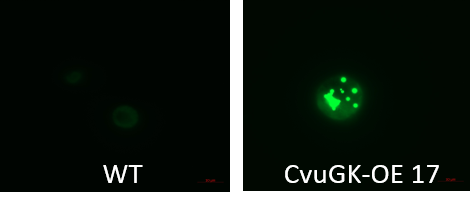Wednesday May 16 // Ana Ramos // PhD Candidate, Regan LabMicroalgae cultivation on wastewater and genetic modifications to increase triacylglycerol productionMicroalgae are photosynthetic microorganisms that can grow in a variety of environments. They have become a popular feedstock for the production of biofuels, high-value chemicals, and nutraceuticals. One of the main products obtained from microalgae is biodiesel: a mix of fatty acid methyl esters (FAMEs) obtained from the transesterification of triacylglycerol (TAG). However, microalgal biodiesel still cannot compete economically with petroleoum diesel. Therefore, the objective of this thesis was to explore alternatives to make microalgal cultivation for biodiesel more efficient. Microalgal treatment of municipal wastewater has been discussed as a strategy for the simultaneous removal of excess nutrients and the generation of microalgal biomass. This thesis evaluated the performance of Scenedesmus sp. and Chlorella sorokiniana in the removal of nutrients from non-sterile, highly concentrated synthetic-wastewater. These microalgae removed up to 60% NH4+ and 44% PO43- in a semi-continuous cultivation mode without negatively affecting effluent quality, demonstrating that microalgal growth can be coupled with wastewater treatment. Microalgal research is growing, but reliable genetic transformation protocols are still not available for many species. Such is the case of Chlorella vulgaris, whose transformation protocol has not been efficiently replicated. Therefore, work with the model Chlamydomonas reinhardtii is a practical alternative for proof-of-concept studies. The work in this thesis generated 5 Chlorella vulgaris starch mutants through UV-mutagenesis, and 4 Chlamydomonas reinhardtii transgenic lines overexpressing Chlorella vulgaris genes involved in glycerolipid metabolism. Starch-less mutant st27 produced up to 3.8-fold increase in TAG, while the transgenic lines increased more than 100-fold. Results from the starch-less mutants illustrate the importance of the organic carbon source in the medium to provide enough carbon precursors for TAG biosynthesis. Similarly, the increases in TAG content of the transgenic lines suggest that increasing glycerol-3-phosphate is crucial to generate oleaginous crops. This thesis illustrates the possibility of generating microalgal strains rich in both starch and TAG, which would be a promising feedstock to implement in microalgal biorefineries. Additionally, two new gene candidates to improve TAG yields in microalgal strains are suggested, expanding on the knowledge available for metabolic engineering of microalgal crops for biodiesel production. 11:30-12:30 BioSci Rm. 3110Comments are closed.
|
Archives
February 2021
|


